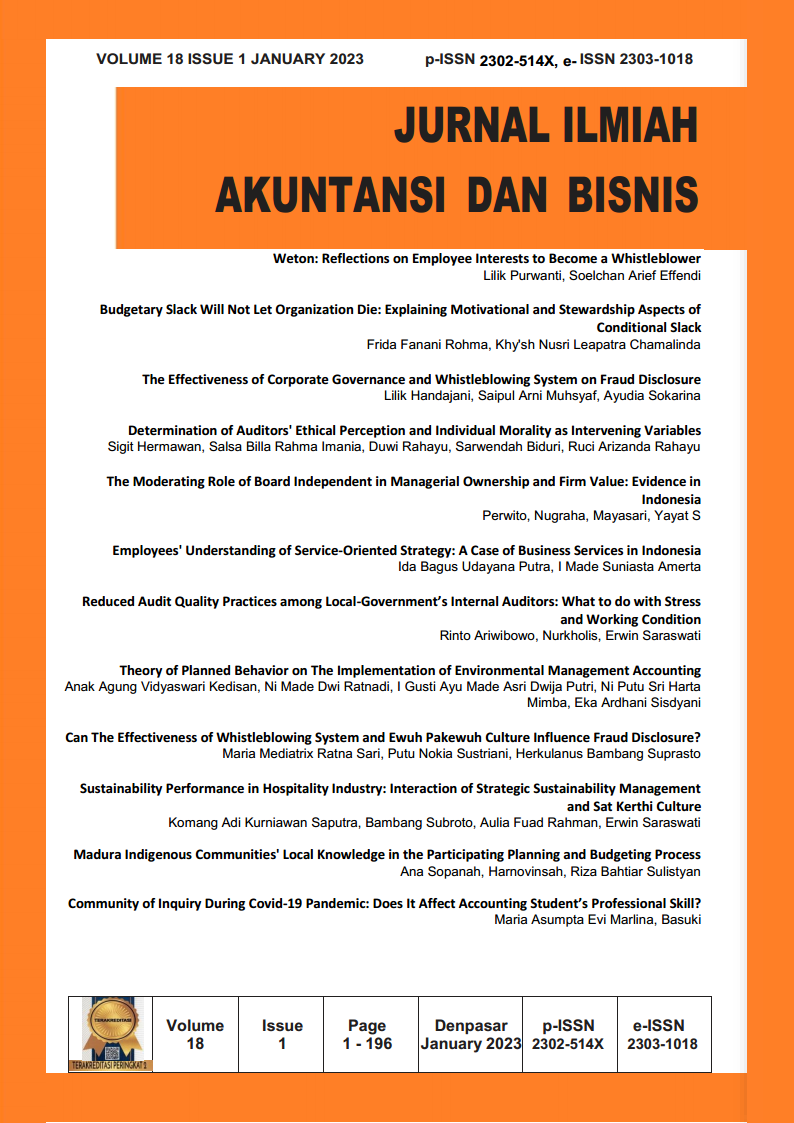Is Sustainability Reporting Really About Reporting Sustainability?
Abstract
Global Reporting Initiative (GRI) introduces a sustainability reporting framework known as GRI standards. Despite its popularity, the GRI standards receive criticism for having covered a broad range of topics but seemingly irrelevant to stakeholders. The objective of this paper is to examine whether the GRI standards truly provide guidelines for reporting what sustainability ought to be reported. This paper uses the thematic analysis to examine whether themes that appear in the GRI standards are in line with Ben-Eli’s (2018) five domains of sustainability (the material, economic, life, social, and spiritual domains). This paper finds that the GRI’s sustainability standards lack the spiritual domain. The spiritual dimension is fundamental to sustainability reporting quality and the coherence of the whole reporting process. The main contribution of this paper is in the form of providing insights into the need to report sustainability as it is, with its root in the ecology field.
Keywords: sustainability reporting, sustainability domains, reporting framework, thematic analysis
Downloads
References
Amadei, B. (2021). A Systems Approach To The Sustainability–Peace Nexus. Sustainability Science, 16(4), 1111–1124. https://doi.org/10.1007/s11625-020-00902-x
Ardiana, P. A. (2019). Stakeholder Engagement in Sustainability Reporting: Evidence of Reputation Risk Management in Large Australian Companies. Australian Accounting Review, 29(4), 726–747. https://doi.org/10.1111/auar.12293
Ardiana, P. A. (2021a). Corporate Reporting Metamorphosis: Empirical Findings From State-Owned Enterprises. Social and Environmental Accountability Journal, 41(1–2), 135–135. https://doi.org/10.1080/0969160X.2021.1914842
Ardiana, P. A. (2021b). Matter Of Opinion: Exploring The Socio-Political Nature Of Materiality Disclosures In Sustainability Reporting. Social and Environmental Accountability Journal, 41(1–2), 131–132. https://doi.org/10.1080/0969160X.2020.1870315
Ardiana, P. A. (2022). Stakeholder Engagement In Sustainability Reporting In Indonesia. PhD Thesis, Durham University Business School, United Kingdom.
Ardiana, P. A. (2023). Stakeholder engagement in sustainability reporting by Fortune Global 500 companies: a call for embeddedness. Meditari Accountancy Research, 31(2), 344–365. https://doi.org/10.1108/MEDAR-12-2019-0666
Ariansen, P. (1999). Sustainability, Morality and Future Generations. In Towards Sustainable Development (pp. 84–96). Palgrave Macmillan UK. https://doi.org/10.1057/9780230378797_5
Bazeley, P., & Jackson, K. (2013). Qualitative Data Analysis with NVIVO. SAGE.
Bellucci, M., & Manetti, G. (2019). Stakeholder Engagement and Sustainability Reporting. Routledge.
Ben-Eli, M. (2015). Sustainability: Definition and Five Core Principles: a systems perspective. A Sustainability Laboratory Publication.
Ben-Eli, M. U. (2018). Sustainability: Definition And Five Core Principles, A Systems Perspective. Sustainability Science, 13(5), 1337–1343. https://doi.org/10.1007/s11625-018-0564-3
Blanc, R., Cho, C. H., Sopt, J., & Branco, M. C. (2019). Disclosure Responses to a Corruption Scandal: The Case of Siemens AG. Journal of Business Ethics, 156(2), 545–561. https://doi.org/10.1007/s10551-017-3602-7
Braun, V., & Clarke, V. (2006). Using Thematic Analysis In Psychology. Qualitative Research in Psychology, 3(2), 77–101. https://doi.org/10.1191/1478088706qp063oa
Buhr, N. (2007). Histories Of And Rationales For Sustainability Reporting. In Sustainability Accounting and Accountability (pp. 57–69). Routledge. https://doi.org/10.4324/NOE0415384889.pt2
Creswell, J. W., & Poth, C. N. (2018). Qualitative Inquiry & Research Design: Choosing Among Five Approaches. SAGE.
Dey, I. (1993). Qualitative Data Analysis. Routledge. https://doi.org/10.4324/9780203412497
Elkington, J. (1997). Cannibals with Forks: Triple Bottom Line of 21st Century Business. Capstone.
García‐Sánchez, I., Hussain, N., Martínez‐Ferrero, J., & Ruiz‐Barbadillo, E. (2019). Impact Of Disclosure And Assurance Quality Of Corporate Sustainability Reports On Access To Finance. Corporate Social Responsibility and Environmental Management, 26(4), 832–848. https://doi.org/10.1002/csr.1724
Garst, J., Maas, K., & Suijs, J. (2022). Materiality Assessment Is an Art, Not a Science: Selecting ESG Topics for Sustainability Reports. California Management Review, 65(1), 64–90. https://doi.org/10.1177/00081256221120692
Gray, R. (2006). Does Sustainability Reporting Improve Corporate Behaviour?: Wrong Question? Right Time? Accounting and Business Research, 36(sup1), 65–88. https://doi.org/10.1080/00014788.2006.9730048
GRI. (2016). Sustainability Reporting Standards, Global Reporting Initiative. The Netherlands.
Gunawan, J., Permatasari, P., & Sharma, U. (2022). Exploring Sustainability And Green Banking Disclosures: A Study Of Banking Sector. Environment, Development and Sustainability, 24(9), 11153–11194. https://doi.org/10.1007/s10668-021-01901-3
Joffe, H., & Yardley, L. (2004). Content And Thematic Analysis. In D. F. Marks & L. Yardley (Eds.), Research Methods for Clinical and Health Psychology (pp. 56–68). SAGE Publications, Ltd. https://doi.org/10.4135/9781849209793.n4
Jones, P., Comfort, D., & Hillier, D. (2016). Materiality In Corporate Sustainability Reporting Within UK Retailing. Journal of Public Affairs, 16(1), 81–90. https://doi.org/10.1002/pa.1570
Kumar, K. (2022). Emerging Phenomenon Of Corporate Sustainability Reporting: Evidence From Top 100
Milne, M. J., & Gray, R. (2013). W(h)ither Ecology? The Triple Bottom Line, the Global Reporting Initiative, and Corporate Sustainability Reporting. Journal of Business Ethics, 118(1), 13–29. https://doi.org/10.1007/s10551-012-1543-8
Parker, L. D. (2005). Social And Environmental Accountability Research. Accounting, Auditing & Accountability Journal, 18(6), 842–860. https://doi.org/10.1108/09513570510627739
Safari, M., & Areeb, A. (2020). A Qualitative Analysis Of GRI Principles For Defining Sustainability Report Quality: An Australian Case From The Preparers’ Perspective. Accounting Forum, 44(4), 344–375. https://doi.org/10.1080/01559982.2020.1736759
Saldana, J. (2016). The Coding Manual for Qualitative Researchers. SAGE.

This work is licensed under a Creative Commons Attribution-NonCommercial-ShareAlike 4.0 International License.




















